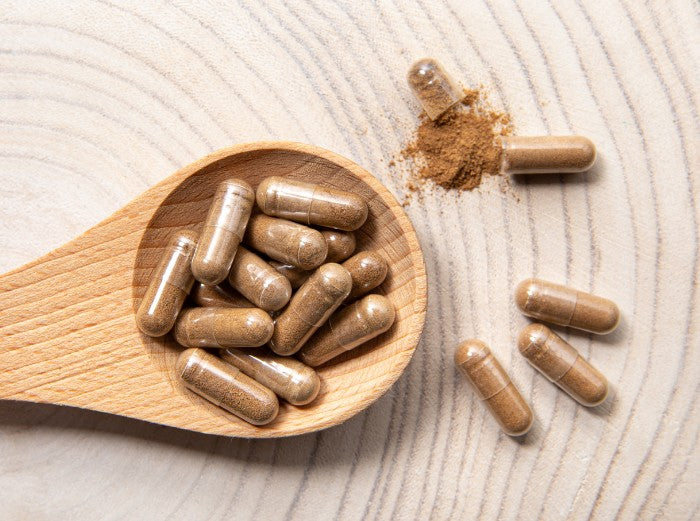Ashwagandha (Withania somnifera) has emerged in recent years as one of the most popular dietary supplements for combating stress, fatigue, and sleep disorders.
But faced with an increasingly wide range of products, it’s becoming difficult to make an informed choice. Form, dosage, traceability, ingredient synergy — what should you look for to choose a supplement that is truly effective and well tolerated?
Here is a buying guide to help identify the best Ashwagandha-based products in 2025.
What Is Ashwagandha and What Are Its Benefits?
An adaptogenic plant native to India, Ashwagandha regulates the body’s response to stress by acting mainly on the HPA axis (hypothalamic–pituitary–adrenal axis).
It particularly modulates the production of cortisol, the stress hormone, and promotes the balance of neurotransmitters such as GABA (inhibitory) and serotonin (which regulates mood and sleep).
Research-validated effects include:
-
A reduction in moderate to severe stress and anxiety
-
Improved sleep, sleep onset, and recovery time
-
Cognitive (memory, focus) and physical (vitality, muscle strength) support
5 Criteria for Choosing the Best Ashwagandha
Criterion #1: The Part of the Ashwagandha Used — Leaves or Roots?
Not all Ashwagandha extracts use the same parts of the plant, which affects their effectiveness and tolerance profile.
Extracts made exclusively from the root (like KSM-66®) respect Ayurvedic tradition and clinical practices. The root is naturally richer and more stable in withanolides, the active compounds of Ashwagandha.
Extracts combining root and leaves (like Sensoril®) may display higher withanolide content (up to 10%) but sometimes show lower tolerance. Some molecules derived from the leaves may be more irritating or interfere with thyroid function.
For daily use, root-only extracts offer the best balance between efficacy and safety.
Criterion #2: The Form Used (Capsule, Powder, Liquid)
The supplement form directly influences its bioavailability and practicality:
-
Raw root powders, non-extracted, are generally low in active compounds (less than 1% withanolides) and poorly absorbed unless properly prepared (rehydration, breaking cell walls). They are better suited for a holistic, non-targeted approach.
-
Standardized extracts in capsules, such as KSM-66® or Sensoril®, are the most effective for clinically validated use. They ensure a measured concentration of withanolides and greater stability.
-
Liquid extracts, although sometimes interesting for absorption, are rarer and often less concentrated.
In 2025, the most reliable form remains the dry root extract in capsules, with controlled standardization.
Criterion #3: The Right Withanolide Dosage
The optimal dosage ranges from 300 to 600 mg per day of standardized root extract at 5% withanolides, according to the most robust clinical studies.
-
Below 250 mg, effects are often barely noticeable.
-
Above 600 mg, some users may experience excessive drowsiness or unwanted sedative effects, particularly with Sensoril®.
Standardization is also crucial: an extract not titrated in withanolides (or without a clear indication) is difficult to assess for efficacy.
An effective supplement always indicates clear standardization (at least 5% withanolides) and a daily dose validated by research.
Criterion #4: Active Synergies
A good supplement is not limited to Ashwagandha alone.
Certain nutrients work synergistically, such as:
-
Magnesium, essential for nervous system regulation
-
Tryptophan, precursor of serotonin and melatonin
-
B vitamins, cofactors for neurotransmission
The combination Ashwagandha + Magnesium + Tryptophan, in particular, provides a reinforced and balanced effect on stress and sleep.
Criterion #5: Manufacturing Quality and Traceability
The quality of the supplement also depends on the manufacturer’s transparency:
-
Clear mention of the extract type (KSM-66®, Sensoril®, etc.)
-
Standardization in withanolides
-
Absence of unnecessary additives
-
Certified manufacturing (ISO, GMP, organic if possible)
A good product should also provide references to scientific studies on its ingredients.
In Summary: Which Is the Best Ashwagandha in 2025?
The best Ashwagandha supplement is the one that meets the following criteria:
-
Root-only extract, such as KSM-66®
-
Standardization to 5% withanolides
-
Clinically validated dosage between 300 and 600 mg
-
Smart synergy with other neuro-supportive ingredients
Our Recommendation: Argalys Ashwagandha KSM-66 + Magnesium + Tryptophan
Our Argalys Ashwagandha formula is based on a rigorous selection of the most effective active ingredients:
-
300 mg of Ashwagandha KSM-66®, for complete action without sedative effect
-
150 mg of magnesium bisglycinate, highly bioavailable
-
100 mg of L-tryptophan, a direct precursor of serotonin
This synergy targets issues related to chronic stress, mental fatigue, and disturbed sleep. Daily intake provides gradual relaxation, without dependency or daytime drowsiness.
References
-
Chandrasekhar K et al. A randomized double-blind, placebo-controlled study of the efficacy of a high-concentration full-spectrum extract of Ashwagandha root in reducing stress and anxiety. Indian J Psychol Med. 2012;34(3):255–262.
-
Wankhede S et al. Examining the effect of Withania somnifera supplementation on muscle strength and recovery: a randomized controlled trial. J Ayurveda Integr Med. 2015;6(3):209–215.
-
Lopresti AL et al. A systematic review and meta-analysis on the effectiveness of Ashwagandha. J Clin Med. 2021;10(8):1991.
-
Richard DM et al. L-Tryptophan: basic metabolic functions, behavioral research and therapeutic indications. Int J Tryptophan Res. 2009;2:45–60.
 04 74 03 98 80
04 74 03 98 80









